With the outbreak of 2019-nCoV in China, some countries start to evacuate their citizens. However, there is a group of people who choose to stay here with us fighting against the disease.
Alexander Toftopyat comes from Russia. In December 2019, he joined the Institute of Technological Sciences of Wuhan University. In his view, Wuhan is a city of talents and cultures with sustained history and innovative spirit. Let’s take a look at current Wuhan in his eyes:
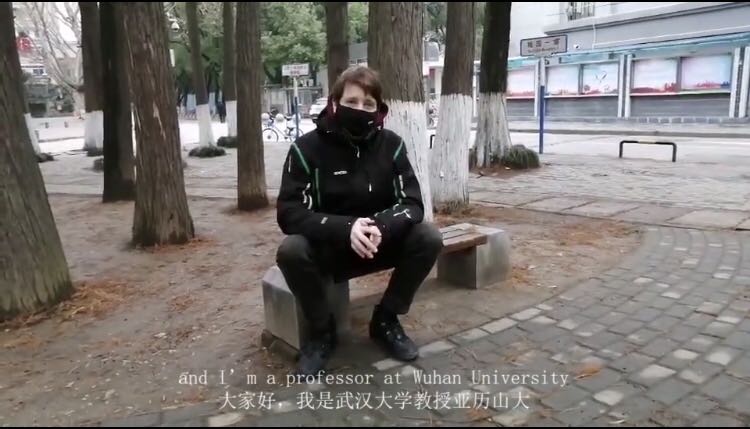
Current Wuhan in Alexander’s eyes
“Hello, my name is Alexander and I’m a professor at Wuhan University. So currently we are in the street of Wuhan. Today we were walking around this city and we saw a lot of people. Not so much as usually for sure but still the town is alive. People are joking, people are walking with kids. Everyone is very nice. Yes, the public transport is still closed. There are still some points where the government is checking the temperature. But it looks like you are able to drive your private cars all over the town. Maybe with some restriction, but there are still cars outside. Unfortunately, a lot of places are closed, something like 90% of vendors. Still, you can function. You can get some food. You can get some water. You can even get food outside. So we will hope that at the end of this week, the situation will be stabilized. The town will be open and its quarantine will be over. So thank you and goodbye.”
In the State Key Laboratory of Information Engineering in Surveying, Mapping and Remote Sensing of WHU, foreign experts also choose to stay in Wuhan.
Timo Balz, a German professor, has been living in Wuhan for 10 years with his family. Having studied, worked, married and had children here, he considered Wuhan as his second hometown.
On 28th January, Rick Salis, the editor of German monthly Cicero, asked professor Balz in the telephone interview: “How do you think of the medical supply there? Do you feel safe in the emergent situation?” Professor Balz answered: “China has experience in fighting against SARS. Wuhan has large research centers as well as expertise. I trust the system here. Although the number of patients is daunting, I believe China can tackle it.” Professor Balz is determined: “We are staying here. We have informed the embassy of this.”
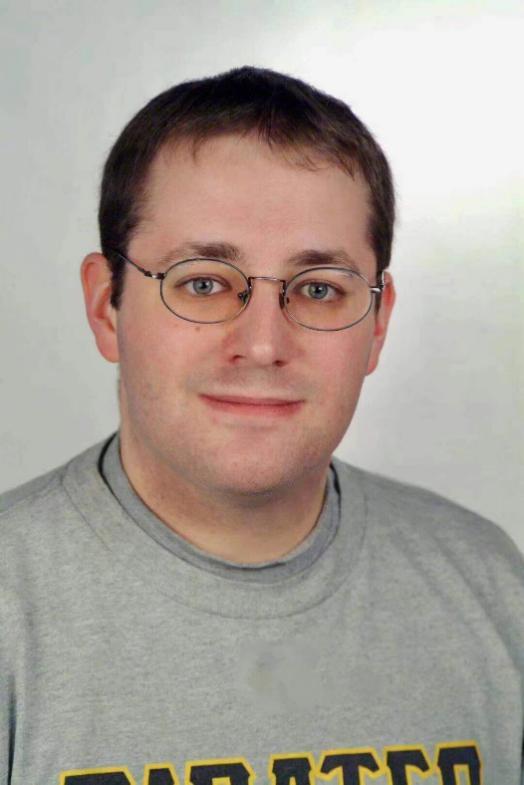
Timo Balz, a German professor in WHU
Stephen McClure, an American professor, has been working in the laboratory for 9 years. He is professional, dedicated, and enthusiastic in his work. When being asked by the US embassy whether he will return to the US or not, he replied firmly that he will stay in Wuhan, fighting against the disease with his colleagues. When he saw the cartoons insulting Wuhan and China, he called the Danish embassy in Beijing, and protested against the misbehavior.
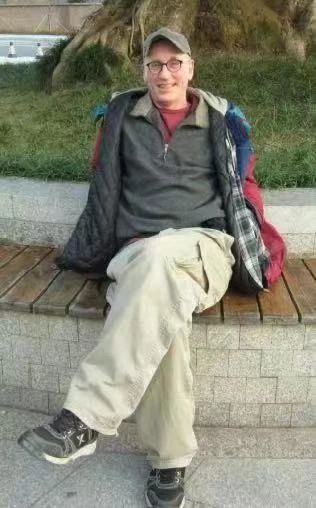
Stephen McClure, an American professor in WHU
Wolfgang Kainz, a professor from the University of Vienna in Austria, comes to work at WHU for 3 months every year. He is also the president of the Austrian Cartographic Association. Having known that Wuhan is suffering from the coronavirus and in shortage of supplies, he and his wife in Austria immediately donated 3000 medical protective masks and expressed support for Wuhan.
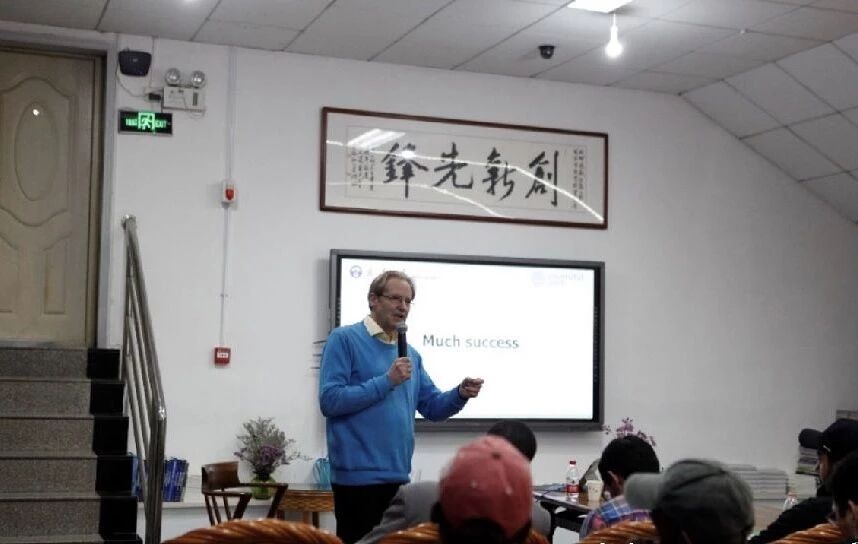
Professor Wolfgang Kainz
Sylvia Schroeder is a German expert in the field of higher education internationalization and a professional trainer in cross-culture education. After working and living in Wuhan for two years, she fell in love with the city. In December 2019, Sylvia returns to WHU and lectures in intercultural communication. However, the sudden outbreak of the disease and the closure of the city prevents her from coming back to Wuhan from Beijing. Here she writes:
“What I have seen over the last few days is a city that has come together with an unrivalled resolve to overcome a major crisis through combined strength of solidarity in the face of adversity, a people working together in self-sacrifice, an unbelievable determination to get the situation under control and a hope for normality to return as soon as possible.
People are going out of their way to help and support each other. They choose to believe that they can beat this ‘thing’ to return life to normal as quickly as possible.”
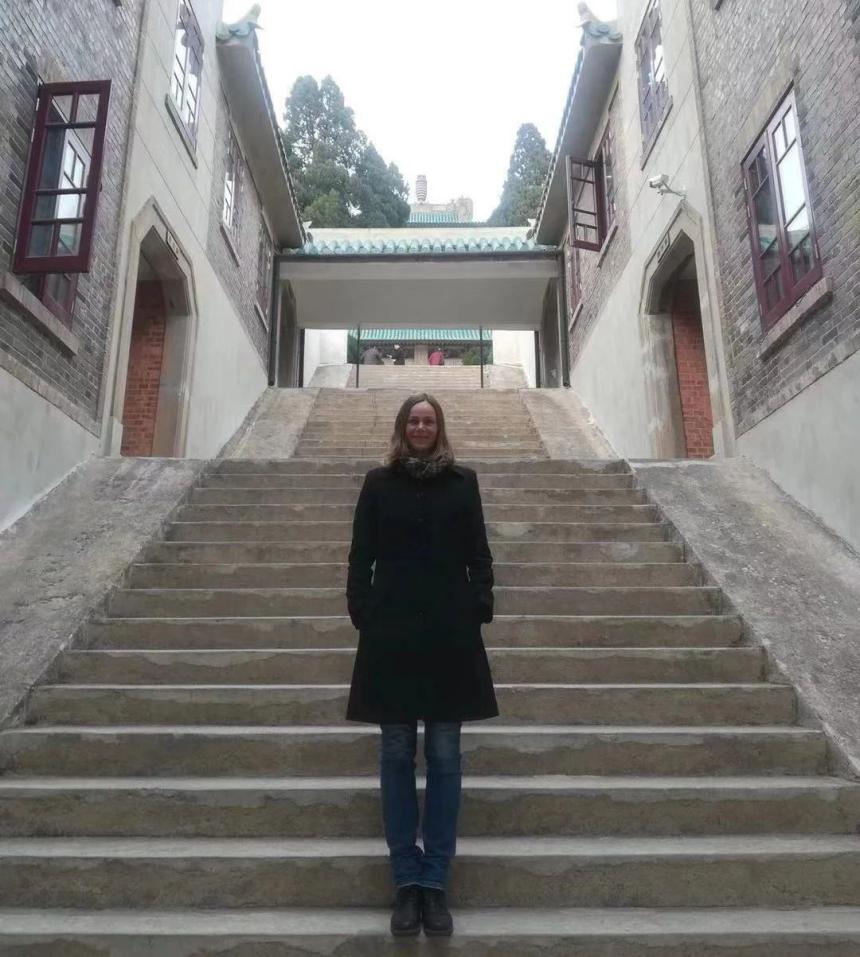
Sylvia Schroeder
These are students from the School of International Education. Some of them will leave soon while some will stay with full confidence. Following are the video clips from them who wish to say something to their families.
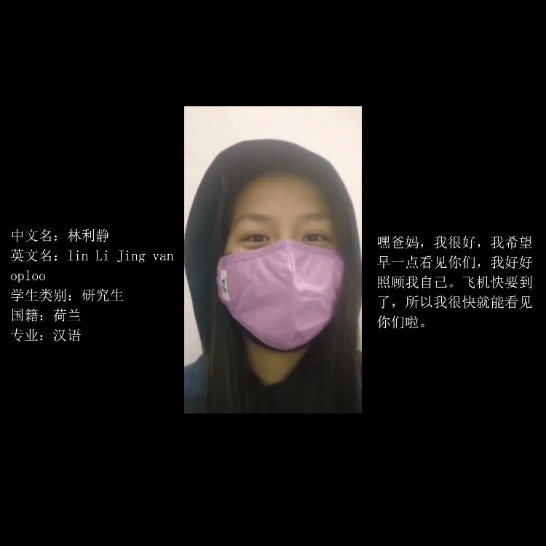
Chinese name: Lin Lijing
English name: Lin Lijing van oploo
Student type: Graduate
Nationality: Netherlands
Major: Chinese
“Hey, mom and dad, I'm fine. I wish I'd seen you guys earlier. I'm taking care of myself. The plane is almost here, so I can see you soon”
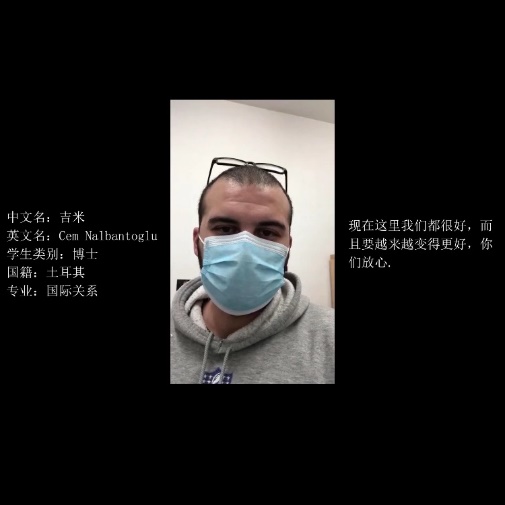
Chinese name: Ji Mi
English name: Cem Nalbantoglu
Student type: Phd
Nationality: Turkey
Major: International Relations
“We are fine here, and it’s getting better. Don’t worry.”
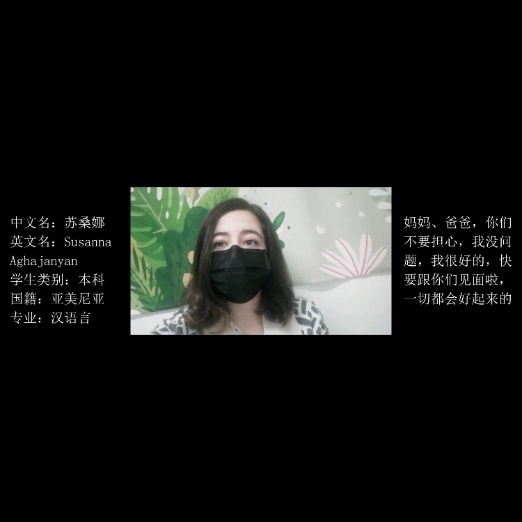
Chinese name: Su Sangna
English name: Susanna Aghajanyan
Student type: Undergraduate
Nationality: Armenia
Major: Chinese
“Mom and dad, don’t worry. It’s ok. I’m doing good. I'll see you soon. Everything will be all right”
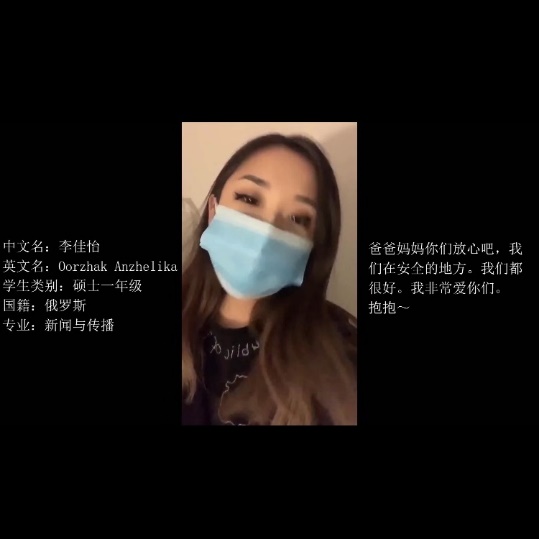
Chinese name: Li Jiayi
English name: Oorzhak Anzhelika
Student type: Graduate
Nationality: Russia
Major: Journalism and Communication
“Mom and dad, you can rest assured, we are in a safe place. We are fine. I love you so much! XOXO”
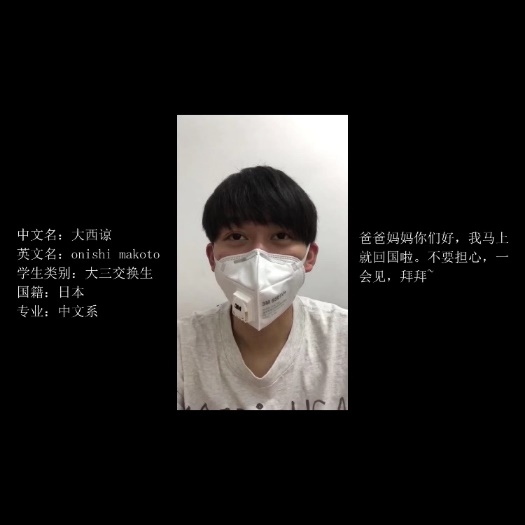
Chinese name: Da Xiliang
English name: Onishi Makoto
Student type: Exchange student
Nationality: Japan
Major: Chinese
“Hey, mom and dad, I’m coming back. Don’t worry. See you soon. Bye~”
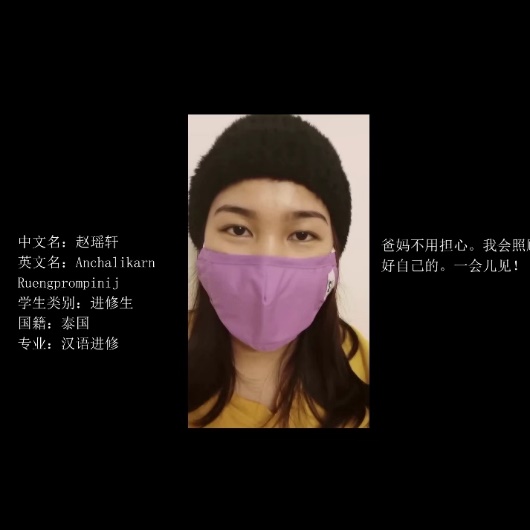
Chinese name: Zhao Yaoxuan
English name: Anchalikarn Ruengprompinij
Student type: Visiting student
Nationality: Thailand
Major: Chinese
“Don’t worry, mom and dad. I’ll take care of myself. See you soon.”
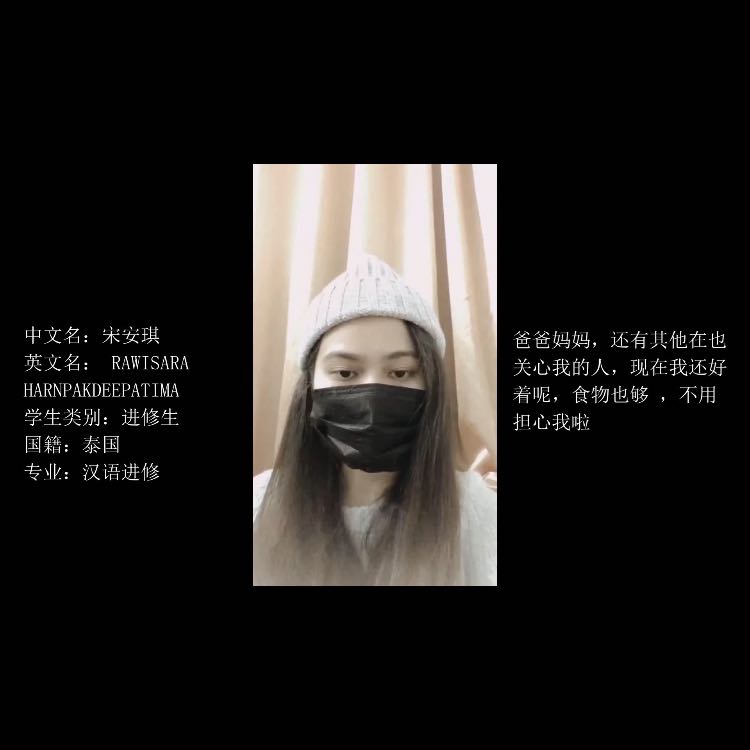
Chinese name: Song Anqi
English name: Rawisara Harnpakdeepatima
Student type: Visiting student
Nationality: Thailand
Major: Chinese
“Mom and dad. A lot of people are caring about me, and I’m fine now. I’ve got enough food, so don’t worry about me! ”
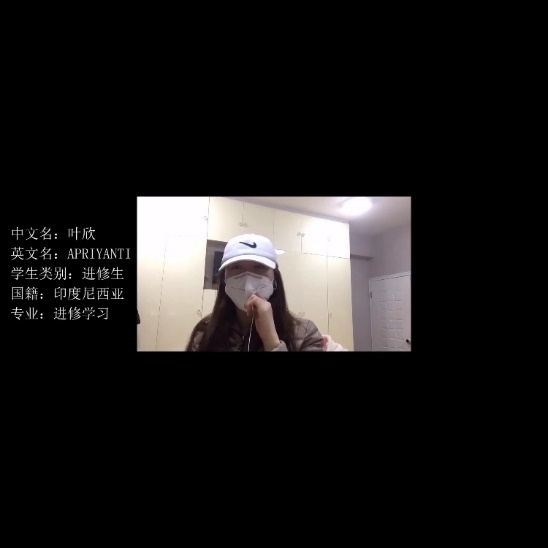
Chinese name: Ye Xin
English name: Apriyanti
Student type: Visiting student
Nationality: Indonesia
“I’m a Chinese from Indonesia. I talk with my family in maderin, so I want to tell my parents and friends that I am safe in mandarin. I’m doing pretty good in Wuhan recently. Actually, it is no different from usual. I’ve got enough food and drink. Mom and dad, I know you worry about the disease and me a lot, and whether I have any problems here. I want to tell you that there are really no problems. I'm eating normally here, and I've been at home a lot lately, so I'm eating more and more. And you don't need to worry, in fact, the supermarkets are still open. It's not all closed, as you might think, or everyone is scrambling to buy things. Don't worry about my food. Everything is the same as usual. It’s just that there are fewer people outside and we have to go out with a mask, and pay attention to hygiene. Basically, there is no problem. So I want to say to you, don't worry too much, I know you are crying or having a bad appetite every day for this, and you are worried about how I am doing here, so I want to show you through this video that I am actually doing well here. There is really no difference, and I believe that things will be better, the Chinese government will solve the virus infection as soon as possible. I believe them, believe myself. I also believe the students in Wuhan. We will be able to overcome the disease, and beat the virus as soon as possible so that we can return to normalg and o back to see our families safely.”
We believe that the bitter winter will pass, and the spring will come as promised
Pictures: Shi Teli, Chen Liqiong, Chen Wanlan, Hu Sijia
Video: Institute of Technological Sciences, School of International Education
Rewritten by: School of Foreign Languages and Literature, Liu Di, Wei Yena, Shen Yuxi, Cao Siyi
Edited by: Cao Siyi and Hu Sijia